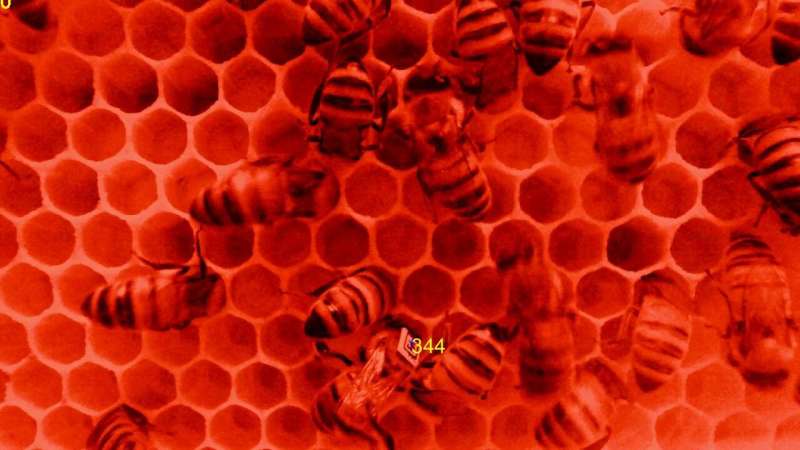This article has been reviewed according to Science X's editorial process and policies. Editors have highlighted the following attributes while ensuring the content's credibility:
fact-checked
peer-reviewed publication
trusted source
proofread
Healthy bees, healthy planet: The impact of balanced diets on honeybee colonies

A new study from the Hebrew University of Jerusalem has revealed that a balanced diet is essential for the optimal health and task performance of honeybees, a key species for pollination and ecosystem stability. The study, led by Prof. Sharoni Shafir from the Robert H. Smith Faculty of Agriculture, Food and Environment, investigates how honeybees balance their nutritional intake to maintain homeostasis and enhance fitness.
The findings indicate that an unbalanced diet with a high omega-6:3 ratio (5:1) significantly affects the bees' ability to nurse larvae, delaying the onset of nursing, reducing the frequency of nursing visits, and altering the attention given to larvae of different ages. The study is published in the journal Animal Behaviour.
To test these effects, 1-day-old adult worker bees were fed either a balanced diet or an unbalanced diet for seven days. The bees were then released into a common-garden hive, tagged with barcodes, and continuously filmed for six days. The analysis revealed that those on the unbalanced diet exhibited delayed nursing behavior and reduced efficiency in caring for larvae, particularly in differentiating between 3-day-old and 4-day-old larvae.
"Balanced nutrition is fundamental for honeybee colonies, impacting not just individual health but also the overall efficiency and survival of the hive," said Prof. Shafir. "Our study underscores the importance of maintaining a balanced omega-6:3 ratio in the diet of honey bees to ensure they can perform their crucial roles within the colony effectively."
The implications of this research are far-reaching, particularly in cultivated landscapes where the availability of nutritionally balanced pollen sources may be limited. The shift towards a greater omega-6:3 ratio in these areas could pose a significant threat to bee populations, affecting their health, cognitive abilities, and ability to sustain their colonies.
"This study opens new avenues for further research linking fitness-related behaviors to nutritional balancing in honeybees," added Prof. Shafir. "It also highlights the need for conservation efforts to ensure diverse and nutritionally adequate pollen sources are available for these essential pollinators."
The research aligns with broader findings in other species, where nutritional imbalances are known to affect survival, reproductive success, and offspring health. It calls for increased awareness and measures to support the nutritional needs of honeybees, essential for maintaining their populations and the vital pollination services they provide.
More information: Danny Minahan et al, Unbalanced dietary omega-6:3 ratio affects onset of nursing and nurse–larvae interactions by honey bees, Apis mellifera, Animal Behaviour (2024). DOI: 10.1016/j.anbehav.2024.05.007
Journal information: Animal Behaviour
Provided by Hebrew University of Jerusalem



















